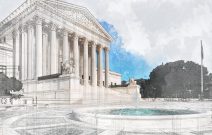Commerce and the Court (I)
I’ve griped before (I think) about the Supreme Court’s less-than-stellar record on protecting the commerce of the United States. The Upside-Down Constitution contains an extended riff on the theme. As always, I am entirely right. A pair of Supreme Court case—a lamentable cert denial last week, and a blockbuster argument this week—confirms the analysis and illustrates the justices’ passive-aggressive posture.
We Are All New Dealers Now
The justices operate under and with a constitution that (a) teems with clauses that are plainly intended to protect a free internal market against state depredations and (b) commits the protection of that principle chiefly to the Supreme Court. In the wake of the New Deal, however, the justices persuaded themselves that the protection of interstate commerce is almost exclusively the province of Congress. True: interstate commerce that must rely on Congress for protection is already half-dead, but that can’t be helped. In particular, federal justices mustn’t protect commerce under the so-called “dormant” Commerce Clause, which (in hundreds of decisions) had been understood to prohibit state interferences with commerce even when Congress had remained silent. The power to regulate commerce, the argument goes, belongs to Congress, not the Court. The dormant Commerce Clause is Lochner in interstate drag, and we can’t have that.
This thinking (loosely speaking) has had enormous gravitational force. Originally peddled by New Deal partisans, it has in modern times been inherited and sharpened by committed originalists. There is no dormant Commerce Clause, they say. The Court should abandon it or at least, confine it to the core purpose of prohibiting “rank” discrimination. If in consequence the commerce of the United States buckles under protectionist and exploitative state regulation, so be it: it just shows how principled we are.
Mercifully and in fairness, though, this après nous school of constitutional thought never held much appeal for more practical, sensible New Dealers (think Henry Friendly). They reconciled the New Deal premise of congressional supremacy with the need to protect interstate commerce by means of latitudinarian statutory construction. When Congress has remained silent, courts should do likewise. In contrast, when Congress burps, the courts should take that as an invitation to create order—not least in the field of interstate commerce.
The webs of decisions spun in this fashion from bare-bones, cryptic statutory provisions are often very intricate, and almost completely self-referential. You can’t “get” the fifteenth or sixteenth decision from the text of the statute (any more than you can get administrative law from the text of the Administrative Procedure Act, or antitrust law from the Sherman Act). That’s not an ideal situation. One shudders to think, however, what would happen to commerce without those constructs.
A perfect illustration of the conundrum is the Supreme Court’s expansive understanding of the Federal Arbitration Act (FAA), about which more tomorrow. Today, the truly dormant Commerce Clause.
Commerce Goes Asleep
Consumers find it convenient to combine an eye exam with the purchase of glasses or contact lenses, and vice versa. The state of California has an unorthodox position with respect to this demand: to its mind, it matters greatly whether the glasses come to the optometrist or whether it’s the other way around. California optometrists and opticians may sell eyewear. However, national eyewear chains (such as LensCrafters) may not employ an optometrist, or even have one on the premises or an adjacent location. Does this make any sense?
Apparently, the chains may locate across the street from an optometrist. So the law may be California’s version of an eye exam and a means of economizing on Medicaid expenses: if near-blind geezers can make it across Highway 9, that proves they don’t need glasses. If they can’t, they won’t need them, either. The state did not proffer this rationale in litigation. But the defenses it did offer are no less laughable (go read the briefs). The state’s actual, unadorned purpose, plain to all but the willfully blind, is to protect a domestic industry from competition.
There’s nothing much more complicated here, and it’s uncontroversial that the dormant Commerce Clause, to the extent that it exists, must surely prohibit this sort of discrimination. The matter came to the U.S. Supreme Court via a cert petition by the National Association of Optometrists and Opticians, represented by Paul Clement (a Righty) and Barry Friedman of NYU (a Lefty, and co-author of, among other fine works, a compelling defense of the dormant Commerce Clause). A persuasive amicus brief in support of cert was signed by law professor from far liberal (Erwin Chemerinsky) to far libertarian (Richard Epstein). The lower courts, confounded by the Supreme Court’s feckless jurisprudence in this area, have been wandering all over the map. The adverse, whacked-out decision below came from the Ninth Circuit, whose edicts the Court ordinarily reviews under a “presumptively erroneous” standard. In short, review in this case shouldn’t have been a matter of doubt, let alone agony; reversal should be a simple matter of good housekeeping. And yet, last week, the justices unceremoniously denied cert. They can’t be bothered.
Tomorrow, a more cheerful take on arbitration.
